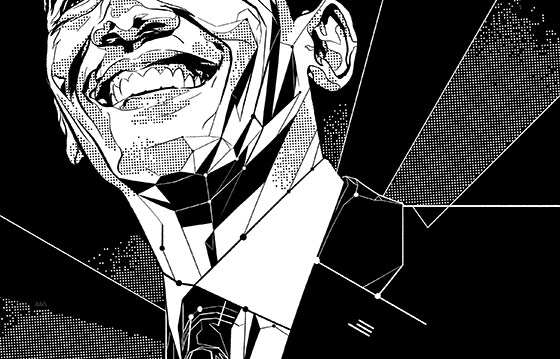
The race between Barack Obama and Mitt Romney, Politico declared in June, was “a grinding, joyless slog, falling short in every respect of the larger-than-life personalities and debates of the 2008 campaign,” and neither candidate did much in the ensuing months to elevate the contest. Yet now, a month after the election, Obama’s campaign team has managed to cast a 2008-like hue on their 2012 victory.
The secret of their successful spin: Instead of talking about how their guy won a second term by methodically defining—and demonizing—his buffoon of an opponent, they’re gushing about the ingenuity of their apps and algorithms.
The new story line began to emerge the day after the election, when Time’s Michael Scherer wrote in a postmortem that the president’s team showed that “the role of the campaign pros in Washington who make decisions on hunches and experience is rapidly dwindling, being replaced by the work of quants and computer coders who can crack massive data sets for insight.” Similar stories soon followed in the New York Times and Bloomberg Businessweek, among other publications. By the time politicos and reporters gathered in Cambridge late last month for Harvard’s quadrennial Campaign Decision Makers Conference, it was Obamanauts like digital director Teddy Goff and field director Jeremy Bird—not David Axelrod and Jim Messina—who were treated like rock stars. “The analytics operation … was awesome through this campaign,” Jim Margolis, Obama’s ad maker, told the gathering. “We should be doing shout-outs all day long for Teddy and all the people who were really looking at this.”
The Revenge of the Obama Nerds narrative does have the benefit of being true. Just like reporters, Obama’s supporters weren’t nearly as enthusiastic as they’d been four years ago, but thanks in large part to the geeks who were obsessively testing which e-mail subject lines netted the most donations (“Hey” was surprisingly lucrative) and studying Americans’ viewing habits to figure out how to best target campaign ads (TV Land turned out to be a voter gold mine), his campaign in 2012 was still able to raise more money and turn out more volunteers than in 2008.
In fact, the tech side was the only part of the Obama operation that could credibly be framed as a throwback to the old Hope and Change: Despite the slash-and-burn quality of the Obama reelection campaign as seen by America’s television viewers, the president’s 33 million Facebook fans “were experiencing a whole different campaign that was largely positive,” Goff explained at Harvard. “What they were experiencing was this uplifting stuff about supporting the middle class, about fighting for education, and that kind of thing.” And when you consider that Obama’s Facebook fans were themselves friends with 98 percent of Facebook users in the U.S.—“That’s more than the number of people who vote,” Goff said—then the Obamanauts can plausibly argue that, for many Obama voters, maybe 2012 wasn’t that different from 2008 after all.
Even more important, the nerd narrative gives the Obamanauts hope for the future. After their historic victory in 2008, they predicted that their candidate was so amazing that he could single-handedly transform Washington by sheer force of will. That obviously didn’t come to pass. But now they are making similar predictions—not because of their man but because of their machine. “Luckily for us, I don’t see anyone on the Republican side who understands what we did,” Bird told me in Cambridge before going on to explain not only his grand designs of electing another Democrat president in 2016, but also for turning Texas blue.
Have good intel? Send tips to intel@nymag.com.